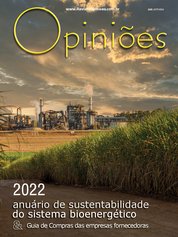Ivan Cesar Zanatta
Gerente de Sustentabilidade da Jalles Machado
AsAA22
Contribuições Ambientais em prol do ESG
O termo sustentabilidade tem sido bastante citado em reuniões empresariais, em apresentações de metas a cumprir, em congressos mundiais. Mas qual a nossa responsabilidade ou contribuição sobre esse tema?
Considerando uma pesquisa realizada pela Febraban, que aponta que 87% dos consumidores brasileiros consideram importante o compromisso com impacto socioambiental, começamos a entender o porquê de o tema sustentabilidade vir com força total para o mundo corporativo, e, se aderirmos aos seus objetivos, teremos uma grande vantagem no mercado e uma melhor contribuição ao meio ambiente.
O assunto empresa sustentável abrange, entre outras, a questão ambiental, que vai além da teoria de como tornar o mundo melhor e passa para a prática, com ações que contribuem para a identificação dos impactos socioambientais negativos causados por operações, cuidando de minimizá-los ou eliminá-los.
De acordo com o Relatório Brundtland, elaborado pela Comissão Mundial sobre Meio Ambiente e Desenvolvimento, “só se pode buscar o desenvolvimento sustentável se o tamanho e o aumento da população estiverem em harmonia com o potencial produtivo cambiante do ecossistema. (…) o desenvolvimento sustentável não é um estado permanente de harmonia, mas um processo de mudança no qual a exploração dos recursos, a orientação dos investimentos, os rumos do desenvolvimento tecnológico e a mudança institucional estão de acordo com as necessidades atuais e futuras”.
Ainda, em 2015, foi aprovado pela ONU um plano de ação chamado Agenda 2030, com o objetivo de incentivar governos, sociedade civil, setor privado e todos os cidadãos na jornada coletiva para ações a serem desenvolvidas quanto ao planeta, a parcerias, à paz, às pessoas.
Nesse plano de ação, foram apresentados 17 Objetivos, que se desdobram em 169 metas, que deverão ser alcançados até 2030. Todos os objetivos se interligam e tratam de assuntos relacionados a questões ambientais, sociais e de governança.
No Brasil, sob o viés da agenda ambiental, uma proposta apresentada por empresas que elevam seu nível de contribuição mundial trata sobre a gestão de recursos hídricos e efluentes. O domínio na gestão de recursos hídricos e efluentes torna-se fator relevante para aquelas empresas que entendem a importância do retorno ao meio ambiente para o desempenho de suas atividades.
A gestão contempla um processo completo, que vai desde o mapeamento e gerenciamento de indicadores relacionados ao tema, gestão para atendimento integral dos requisitos legais vigentes, metas definidas para o consumo de água, tanto na área industrial como na área agrícola, alinhadas aos valores outorgados, até planos de ações com o objetivo de reduzir o consumo e minimizar o impacto das operações sobre esse recurso.
Monitorar a qualidade da água e seus efluentes tem como objetivo atender a diretrizes para o acompanhamento das atividades realizadas na área de influência industrial e operação de aterro controlado. Outras ações para evitar o assoreamento dos corpos d’agua nas áreas de plantio tratam de atividades de manejo e conservação do solo; assim, com o uso correto de metodologias e técnicas, se controla erosão e lançamentos de qualquer tipo de efluentes em mananciais, por exemplo. O controle biológico de pragas também pode ser citado como um instrumento que minimiza o impacto sobre a água, pois ele evita a contaminação do ambiente com defensivos agrícolas, que poderiam ser carreados para os cursos d’água.
Outro exemplo sobre contribuição à agenda ambiental está na recuperação de áreas de preservação permanente, evitando o assoreamento dos mananciais em períodos chuvosos e a manutenção do fluxo da água, mesmo em períodos de estiagem – isso também contribui para a recuperação de áreas em degradação.
Essas ações relacionadas ao desenvolvimento e à preocupação com o meio ambiente só agregam valor às companhias, uma vez que se estreitam os laços com os stakeholders com base na confiança e propósito gerado na entrega do produto. Esse relacionamento é fundamental para o sucesso no longo prazo e na construção de uma reputação positiva. Aliás, meio ambiente é direito fundamental.




